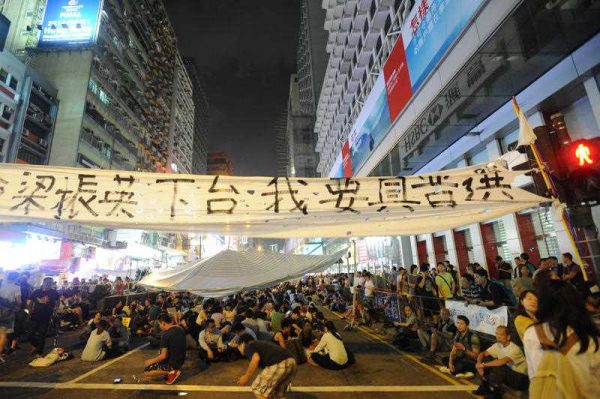Heroic protesters have braved pepper spray and tear gas, refusing to be intimidated. Civic groups and media have condemned the heavy-handed tactics employed by Hong Kong’s police force against student protestors. They have demanded the withdrawal of Beijing’s restricted form of universal suffrage.
Under the terms of Beijing’s offer, Hong Kong’s future chief executive must be vetted by a 1200 person nomination committee, which is largely comprised of Beijing loyalists. The offer is simple and unambiguous; Beijing has made it clear it does not want anti-Communist democrats running Hong Kong.
Yes, it is anti-democratic. But is it that unthinkable for an authoritarian government to reject a chief executive who is openly hostile to Beijing? Imagine the impact of a complete breakdown in the relationship between Beijing and Hong Kong’s government. This is something Beijing desperately wants to avoid.
The Communist leaders are still mystified as well as annoyed by the fact that Hong Kong citizens seemed quite happy to accept London-appointed British colonial governors without resistance.
But a larger question looms: what prompted these students to take to the street in the first place?
Melissa Chang, a former Al Jazeera Beijing correspondent who was expelled from China, offers one of the most perceptive comments on the escalating confrontation in the former British crown colony: ‘Always sexy for headlines in the US/West to talk about people protesting for democracy, but it’s also about the economy’, she tweeted.
While we support and cheer Hong Kong citizens’ fight for democracy, it is also important to recognise Hong Kong residents’ frustration with Beijing. Dissatisfaction with its puppet government in Hong Kong goes much deeper than just its electoral reform proposal. Many grievances are related to wider economic and social ills that have little to do with democracy and elections.
Although Hong Kong is still one of the freest economies in the world, it has long ceased to be a land of opportunity for ordinary Hong Kong residents. It is a city dominated by billionaire plutocrats and Chinese red princelings.
The city has one of the highest per capita rates of billionaires in the world: 39 billionaires in a total population of 7 million, according to a Forbes rich list. At the same time, around 1.3 million people, nearly 20 per cent of the population, were deemed to be living under the official poverty line in 2013.
Hong Kong’s Gini coefficient, a gauge of income inequality, increased from 0.525 a decade ago to 0.537 in 2011, according to official data. The measure is at its highest level since records began in 1971.
Hong Kong’s middle class and university graduates are facing ever greater competition for the island’s limited educational and healthcare resources as well as real estate from mainland migrants, investors and students. The Apple Daily recently ran a controversial full-page advertisement, paid for by public donations, featuring a giant locust (an imaginary representation of mainlanders) looming large over Hong Kong’s skyline.
The ad came about as a result of popular backlash against mainland mothers who come to Hong Kong to give birth so their children can be eligible for better resources. The ad and subsequent confrontations between Hong Kong nativists and mainland tourists have generated widespread anger among mainland tourists.
This is one of the major reasons the democracy movement in Hong Kong has generated such a mixed reaction in mainland China. Though the authorities have severely restricted the coverage of the protests in Hong Kong, a limited reaction on social media and other online forums suggest many people believe there is an element of anti-China sentiment in the movement.
Sara Zhong Hua, a sociology professor at the Chinese University of Hong Kong who comes from the mainland, told Al Jazeera that anti-Beijing and anti-mainland sentiment is often conflated in Hong Kong.
‘Myself and many mainland scholars in Hong Kong, we do support a political movement, a movement for democracy’, she said. ‘But with the growth of anti-China sentiment, we feel discriminated against and frustrated. So there is less we can say to support them’.
The reality of close economic integration with the mainland is that it benefits Hong Kong’s ruling establishment more than the island’s ordinary residents. Long-simmering social and economic tensions have now erupted, sparking a large-scale protest against Beijing.
The source of Hong Kong’s political crisis is more than just about universal suffrage; it is about the fact that the island’s colonial-style government, which has served the island so well, is breaking down. Let’s admit it: the Chinese and British have both relied on the same Hong Kong tycoons, such as Li Ka-Shing, the richest godfather in Asia, to rule the island.
To tackle Hong Kong’s political crisis, it will take more than a freely elected chief executive. It will require taking on Hong Kong’s powerful establishment that is allied with both Chinese Communists and foreign multi-nationals.
Peter Cai is an Australian journalist and a former Commonwealth Treasury policy analyst. The views in this article are his own and not those of his current or former employers.
This article was originally published here, on ‘Business Spectator’.


Although I don’t live in HK, this makes sense to me. However, it seems to me if most of the HK people feel this way, they should have joined the students to demand a greater voice in the governing of HK.
TFS
Delightful piece; thoroughly insightful.